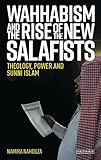Wahhabism and the rise of the new Salafists : theology, power and Sunni Islam / Namira Nahouza.
Series: Library of modern religion ; 68.Publisher: London ; New York : I.B. Tauris, 2018Copyright date: @2018Description: xvi, 256 pages ; 23 cmContent type:- text
- unmediated
- volume
- 9781788311427
| Item type | Current library | Home library | Collection | Call number | Materials specified | Copy number | Status | Date due | Barcode | |
|---|---|---|---|---|---|---|---|---|---|---|
| AM | PERPUSTAKAAN TUN SERI LANANG | PERPUSTAKAAN TUN SERI LANANG KOLEKSI ISLAM-P. TUN SERI LANANG (ARAS 4) | - | BP195.W2N335 ki (Browse shelf(Opens below)) | 1 | Available | 00002223907 |
Includes bibliographical references (pages 223-237) and index.
Abstract -- Acknowledgements -- Table of contents -- Table of figures Notes on transliteration, translation, abbreviation and links INTRODUCTIONOutline of the book -- Definition of'Salaf' -- Definitions taken from Arabic dictionaries, the Qur'an, and Hadith -- Salaf as: the first three generations after the Prophet -- Salaf: central notion in constructing orthodoxy -- The Salaf, the Salafists, and the issue of the Attributes of God -- Limitations of the book CHAPTER One: Introduction to Islamic theological issues -- The origins of the main theological schools -- The importance of the issue of the Attributes of God Summary of Ash'ari theological arguments --'God exists without a place' -- Ambiguous verses and hadiths CHAPTER Two: Historical perceptions -- The Salaf and the Attributes of God: perceptions of scholars towards a consensus on the position of the salaf -- Additional information on excerpts -- al-Bayhaqi (d.1066) -- al-Juwayni (d.1085) -- al-Nasafi (d.1114) -- al-Shahrastani (d.1153) -- Ibn al-Jawzi (d.1200) -- al-'Izz ibn'Abd al-Salam (d.1262) -- al-Nawawi (d. 1277) -- Ibn Khaldun (d.1406) -- Ibn Hajar al-'Asqalani (d.1449) -- Ibn Hajar al-Haytami (d.1567 ) -- al-Qari (d.1605) -- al-Bayadi (d. 1686) -- al-Murtada al-Zabidi (d.1791) -- Perceptions of opponents to the consensus -- Additional information on excerpts -- Abu Ya'la (d.1066) -- Ibn al-Zaghuni (d.1133) -- Ibn Taymiyya (d.1328) -- al-Dhahabi (d.1348)CHAPTER Three: Wahhabism: a historical overview -- Wahhabism : a short history -- Is there a pre-Wahhabi and post-Wahhabi era? -- The naming of his movement: from Wahhabis to Salafis and to Salafists -- A typology of Salafists -- What was the position of the Wahhabis on the issue of the attributes of God? CHAPTER Four: Modern approaches since the rise of Wahhabism -- Since the rise of Wahhabism: a consensus on the position of the Salaf -- Presentation of the sources -- al-Subki al-Azhari (d.1932) -- al-Dujwi (d.1945) -- al-Zurqani (d.1947) -- al-Quda'i (d.1956) -- al-Dusuqi (d.?) -- Diyab (d?) -- Ibn Marzuq (d.1970) Ibn'Ashur (d. 1973) -- al-Harari al-Habashi (d.2008) -- al-Buti (d.2013) -- Recent opposition to this consensus -- Presentation of the sources -- Ibn Baz (d.1999) -- Muhammad al-'Uthaymin (d.2001) -- al-Fawzan (b.1933) -- al-Hawali (b.1954 ) -- al-'Awda (b. 1955) -- al-Khudayri al-Dumayji'Abd al-Rahman ibn'Abd al-Khaliq (b.1939) -- IS literature -- Abdullah al-Faisal, a supporter of IS CHAPTER Five: A vision of history opposed to Sunni Islam -- The'traditional' vision of Islamic history -- Two theological schools, four legal schools -- A long continuum of scholars -- Representing the majority of Muslims -- The Salafists' specific vision of history Ash'arism as a misguidance rejected by al-Ash'ari himself -- Notions of rupture -- Numeric superiority is not decisive -- Referring to'Sunnism' : a word of caution CHAPTER Six: Case studies on the debate around the attributes of God and its consequences -- Presentation of the Cyber Islamic Environments used for these case studies -- Debates on the reality of God in sunni Islam and on anthropomorphism -- Salafists recuse the accusation of anthropomorphism -- The Sunni Answers blog -- The Era of YouTube preachers: the example of Abdul Rahman Hassan -- Some consequences of this debate -- The Khalas blog -- A Christian response to Salafist theology The theology of IS and some of its supporters Conclusion: Scholarly and Strategic implications of the Study For a redefinition of the theology of the Salafists and of Sunnism -- Theology and counter-terrorism -- A need for more exploration of classical Islamic sources and concepts APPENDIX : two detailed interpretations by al-Razi - Notes - Bibliography -- Index
'While previous scholarship has examined Wahhabism as a political phenomenon, this book turns attention to the complex religious issues that are central to its understanding. Tracing its roots in the 18th century up until the present day, Namira Nahouza shows why the Wahhabi movement has opposed traditional Islamic scholarship on the interpretation of the Qur'an and hadith. Of key importance, Nahouza shows, are the differing beliefs about the oneness of God and God's names and attributes, issues on which both Wahhabi and other Salafi groups are united. Based on extensive research into classical and contemporary Arabic religious sources, Nahouza presents the contours of Sunni theological debate and reveals how the Wahhabi movement became the predecessor to the Salafism we see today. In highlighting the far-reaching consequences of these theological divisions - both for Muslim communities and the world at large -the book fills a significant gap in existing research and is essential reading for scholars researching Islamic Theology, Islamic History, Security Studies and Islamic Radicalism'.
There are no comments on this title.

